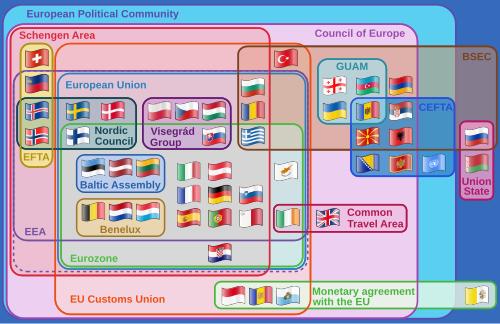Top Qs
Timeline
Chat
Perspective
Greater Europe
Idea of an extended Europe From Wikipedia, the free encyclopedia
Remove ads
Greater Europe refers to the idea of an extended Europe that generally implies a Europe transcending traditional geographic boundaries to include trans-Eurasian countries,[1] or countries in close proximity to Continental Europe with strong political, economic, or cultural links to Europe.[2]
This article possibly contains original research. (November 2022) |
Remove ads
Definitions

The concept of Greater Europe may specifically deal with the current enlargement agenda or the potential future enlargement of the European Union.[citation needed]
It may also reference a more "re-unified" Europe after the fall of the Iron Curtain,[3] the intensification of European integration, the potential establishment of a Federal Europe, or to the concept of the Eurosphere and of Europe's increasing global influence.[4][5][6]
Other definitions of Greater Europe may include all European states and CIS countries or all European states and the post-Soviet states of the Eurasian Economic Union; theoretically stretching from Lisbon to Vladivostok.[citation needed]

Founder states
Later members
Former members
Remove ads
Support

An Euler diagram showing the relationships between various multinational European organisations and agreements
Several organizations exist promoting discussion and debate surrounding Greater Europe, among them the Institute for a Greater Europe and the Youth Association for a Greater Europe.[7] There are also several organizations which promote increased dialogue and greater economic and political integration among states within Greater Europe, including[citation needed]:
- Assembly of European Regions
- Commonwealth of Independent States
- Community for Democracy and Rights of Nations
- Council of Europe
- Eastern Partnership
- Euro-Mediterranean Parliamentary Assembly
- Euronest Parliamentary Assembly
- European Bank for Reconstruction and Development
- European Higher Education Area
- European Olympic Committees
- European Political Community
- Mediterranean Union
- Organization for Security and Co-operation in Europe
- Organization of the Black Sea Economic Cooperation
- TRACECA
Remove ads
Economic integration in greater Europe
Summarize
Perspective
Lisbon Vladivostok initiative
The vision of a common economic space from Lisbon to Vladivostok has been debated since the 1950s. The Lisbon Vladivostok Initiative believes that this vision can be turned into reality, and sees a multi-level partnership between the European Union (EU) and the Eurasian Economic Union (EAEU) as the core aspect of a common economic space. Cooperation between the EU and EAEU could bring enormous benefits for trade and business in Europe and Eurasia. The Initiative was founded in 2015 and is driven by businesses, business associations, and think tanks from member countries of the EU and EAEU. Among the founding members are the German-Russian Forum, the German Chamber of Commerce, and the German Eastern Business Association, as well as international corporations such as Siemens, Bosch, Severstal and others. Today, the Initiative counts on more than 100 members from 12 countries from the EU and EAEU. It sees itself as an open circle involving all countries from Lisbon to Vladivostok.[8][9]
Goals of the Lisbon Vladivostok initiative
The markets of the EU and the EAEU cover more than 630 million inhabitants. Despite different levels of development of the two unions, by creating lasting networks between officials, maintaining continual dialogue, and through the establishment of a common economic area in the countries of the EU and the EAEU, it may be possible to combat European and Eurasian issues of the future more effectively.
See also
- Continentalism
- Pan-Africanism
- Pan-Asianism, a similar movement in Asia
- EMEA – Geographical region for global institutional and marketing planning
- Eurafrica
- Eurasia
- Eurosphere
- European integration
- Foreign relations of the European Union
- Politics of Europe
- Pro-Europeanism
- Regions of Europe
References
External links
Wikiwand - on
Seamless Wikipedia browsing. On steroids.
Remove ads

